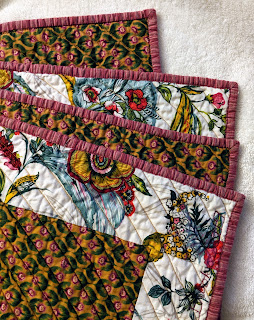The logic of nationalism always flows downhill, toward the gutter.
~ Adam Gopnik
Of course I had to use the last few toile diamonds - rabbits paired with squirrels this time.
 |
| Lone Star 7 baby quilt |
The row where the diamonds split into points is the lightest round in this quilt. It's not usually my favorite locations for lights but the background is dark. I used the rest of this Australian print, combining it with a funky greyed chartreuse floral. when it ran out. The subtle variation works well... at least IMO.
The centers went together easily but there were a few possibilities for the outer points. The lighter diamonds on the left or dark ones on the right.
 |
| Looking at different diamonds in the star points |
When the large diamonds were sewed it was time to choose a background. My favorite is the large scale floral on white but there was not nearly enough. I tried combinations of grey-blue and mustard, alone and together to see what worked. Close up the mustard seemed too dark but fortunately we have digital photos. It's a winner.
Dusting off my math skills, I calculated the size of the corner squares and subtracted the width of the outer border to determine a cut for the inner border. 13 - 4 = 9 + 0.5 so 9.5" square and 4.5"x13.5" rectangles. You'll notice I deliberately chose to extend the border beyond the start point - to make it larger and to avoid having to match those points with the binding. Ugh.
Next I multiplied the total width of that corner square by 1.41 {square root of 2} to get the hypotenuse of the background triangle. (13 x 1.41= 18.33) After double checking that each leg of that triangle congruent to the width of the square, I halved the hypotenuse to find the height of that triangle. (18.33 / 2 = 9.165 or about 9.125")
Subtract the width of the outer border here to get the height of the inner triangle. Add seam allowances and cut. 9.125 + 1.25 = 10.375" square cut QST. Then outer borders 19.625" by 4.5". Edit: Math calculations added. Use your own diamond side lengths for your work.
It's just math; the real magic is how well these two fabrics worked together.
 |
| Auditioning background fabrics |
Same old, same old quilting design. It works well across all the fabrics and repetition increases my muscle memory and skill {hopefully}.
 |
| Orange peel quilting in the center before spiraling out |
The binding gave me a few problems. I was sure red was the answer. Wrong-o. No dark green in the right tones could be found even after pawing through the stash. No blues worked either. Finally this little pinky-purple stripe called me. Kaja sent it to me last year. It seemed like a waste to use it on the binding but it's perfection. Thanks, Kaja!
 |
| Quilting and binding detail, Lone Star quilt 7 |
After a quick wash and dry the batting shrunk up more than usual. Or perhaps the striped binding makes it appear scrunchier. I wish I'd washed it before adding the binding.
 |
There was enough of the mustard print for the whole back, something that rarely happens around here. And there's enough for the back of another baby quilt. Oh, good. These fabrics are moving along! Don't misunderstand. They are all lovely but I've been saving them for the perfect quilt - that mirage in the distance we always look at longingly.
Amounts like this {3-4 yards} continually wait for the spot that needs that exact yardage because "we can't waste any." ROTFLOL! But leaving it to molder in the stash is another waste. My new story is to use them up now. There will be more lovelies tomorrow.
The Superior thread was a gift from a fellow conference attendee and it is the best thread I've used in a long time. I know it's available online but I need to see if there's a local source... and if it comes on large spools.
Quilt Specifics
Size: 37" x 37"
Designs: Lone Star
Batting: Pellon 100% cotton
Thread: Superior MasterPiece 50 wt golden brown cotton
Quilting: Spiral with walking foot
Approximate Yardage: 3.75 yd
Me Made Update
With the kinks worked out, a second shirtwaist dress made up fairly quickly. Now that the neck is tighter in back, the sleeves don't bind when I move. I've needed summer dresses for a while but couldn't find anything appropriate in the stores - washable, modest, lightweight. Houston summers are meltingly hot and humid.
This time I pleated the skirt instead of gathering it and deepened the pockets. I'm pleased with the matching of the plaids on the front placket and sides but somehow forgot to match the sleeves.
 |
| Brown and blue plaid shirtwaist dress |
The plaid has been in my stash for donkeys years. It's a thin tight weave that should wash and wear well. Done is great but well done is the best.
Clothing Specifics
Style: Shirtwaist
Pattern: Out of print McCall's
Fabric: Lightweight woven cotton plaid
Yardage: 4 yds 45" wide
Yardage: 4 yds 45" wide
Thread: Superior MasterPiece 50 wt brown cotton